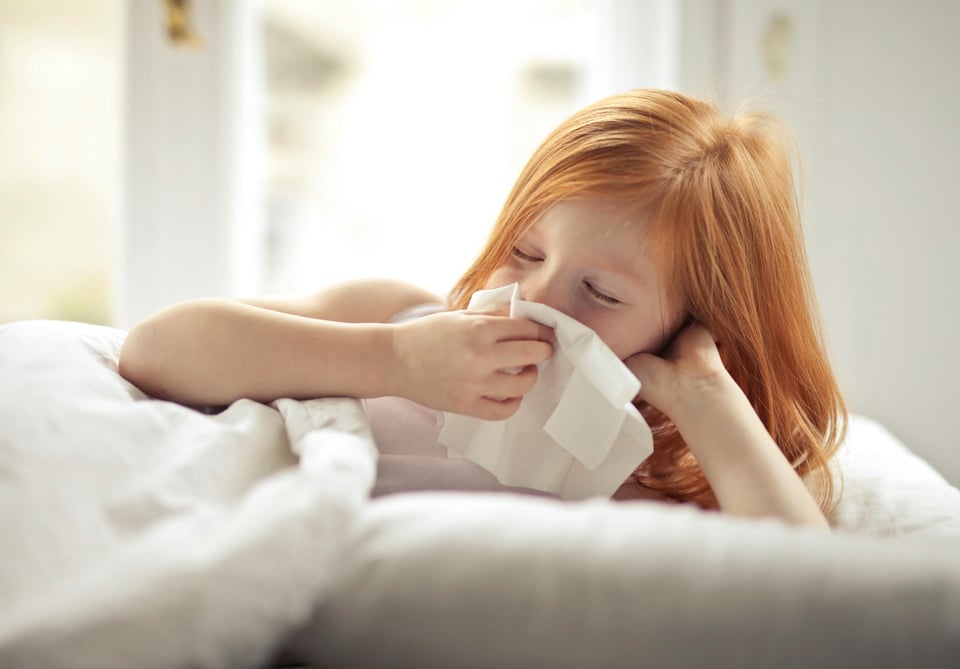'Tis the Season for Colds! When to Keep Your Child Home from Preschool

Updated for 2025
Let's face it, this time of year can feel like one long cycle of snot, sniffles, and sleepless nights. Is it just a little cold, or is it serious enough for a sick day?
It's difficult to know when to keep a child home or send them to school, especially since children often catch 6-8 colds a year. For parents, recognizing when a child needs rest versus when a minor cold is manageable is a delicate balancing act.
As a busy parent, you're the expert on your child. You know instantly when they're "not themselves." But in a busy place like preschool, we have to follow clear rules to keep everyone healthy.
When should a child be kept at home from Preschool? (2025 update)
Figuring out when to call in sick is tough, but public health guidance is usually very clear. Think of it this way: if your child is too sick to play comfortably, or if their illness poses a risk to others, they need to be home.
Here are the key symptoms that mean your child MUST stay home to rest:
- Fever: Any temperature of 100∘F or higher.
- Vomiting or Diarrhea (Stomach Bug): They should stay home until symptoms have completely stopped and their appetite has mostly returned.
- Lethargy or Behavioral Changes: If your child is unusually clingy, irritable, or simply cannot participate in routine activities.
- Colored Mucus: A runny nose with green or yellow mucus or an uncontrolled/excessive cough.
- Signs of Contagious Illness: Unexplained rash with fever, open sores or other signs of infection.
What if it's "just" a runny nose and cough?
The good news is: a mild runny nose or a slight, occasional cough usually isn't a reason to pull them out of school.
If those mild symptoms don't affect their energy levels or appetite, meaning they're still happy to run, eat, and play, they're likely well enough to come to preschool. You know your child best and, as always, err on the side of caution and consult your pediatrician if you are unsure.
Kids Konnect Preschool illness exclusion policy (Key rules)
To make your decision easier, here are the absolute, non-negotiable rules we follow to protect our classrooms:
- Fever-Free Duration: Children MUST be fever free for 48 hours (without the use of fever-reducing medication) before returning to the program. Our fever threshold is 100∘F or higher.
- Required Pick-Up: If your child gets sick during the day (fever, excessive cough, colored mucus), we'll call you, and a parent or registered grown-up must pick them up within 30 minutes.
- Contagious Illness Stay-Home Period: If a child is sent home due to a contagious illness (such as vomiting or diarrhea) they need to stay home for 48 hours after the last episode stops. This is key to preventing widespread outbreaks.
- Overall Wellness: If they have an excessive, thick green runny nose, or if they just seem unwell, please choose to keep them home until symptoms clear.
Best practices to prevent colds and viruses
Health bodies like the CDC stress three things we can all do to make a difference:
- Seasonal Vaccinations: Guidance prioritizes the seasonal Flu vaccine (often a painless nasal spray!) and ensuring children are current on any updated COVID-19 or RSV shots.
- Fresh Air Matters: When indoors, let fresh air in! Ventilation is a key defense. Open windows whenever possible to bring in fresh air and reduce the spread of airborne particles.
- Basic Hygiene: You know the drill—wash hands for 20 seconds (singing the "Happy Birthday" song twice helps!), and teach them the "Catch it, Bin it, Kill it" method for coughs and sneezes.
What to do if you think your child has Covid-19 (winter 2025 update)
The great news for 2025 is that health authorities are treating COVID-19 just like the Flu or RSV—it’s now managed as a common respiratory illness.
- When to Stay Home: If your child has COVID-19 symptoms or tests positive, they should stay home.
- When to Return: They can come back to school when they feel well enough, and their fever has been gone for 24 hours without medication. Their general symptoms should also be improving.
How to help your child feel better
While there's no cure for the common cold, you can absolutely make your little one more comfortable while they recover:
- Hydration is King: Keep those fluids flowing! Water, broth, or electrolyte solutions are great.
- Encourage Rest: Let them be lazy! Lots of naps and sofa time help their body fight the germs.
- Clear the Nose: Try a saline nasal spray and slightly raise the head of their bed at night to help relieve congestion.
- Call the Doctor: If symptoms drag on, get worse, or if your child has trouble breathing, don't hesitate to seek advice from a healthcare professional.
Contact Kids Konnect
Is there anything in particular that helps you decide whether to keep your child at home from preschool? At Kids Konnect we’d love to know! Please leave your comments below or contact us at Kids Konnect.
